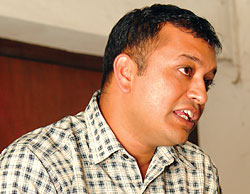 It is unfortunate that Gagan Thapa's media image often precedes him. This image unjustly characterises the fiery student leader as a radical when in fact he is a moderate. He is an opponent of absolute monarchy, of Maoist extremism and a critic of democratic mismanagement. As a proponent of peaceful activism, he is atop a political gold-mine. Ascertaining his claim of generational representation is difficult, but his mastery of channeling discontent qualifies him as an accredited envoy of a significant population of young, eligible voters, disgruntled by the prospect of an uncertain future.
It is unfortunate that Gagan Thapa's media image often precedes him. This image unjustly characterises the fiery student leader as a radical when in fact he is a moderate. He is an opponent of absolute monarchy, of Maoist extremism and a critic of democratic mismanagement. As a proponent of peaceful activism, he is atop a political gold-mine. Ascertaining his claim of generational representation is difficult, but his mastery of channeling discontent qualifies him as an accredited envoy of a significant population of young, eligible voters, disgruntled by the prospect of an uncertain future. But Gagan Thapa's stance is wrought with political minefields. The fact that his ideology doesn't fully comply with the leanings of any single political group is more of a calculated risk and than a carefully planned hedge.
Gagan Thapa could be an asset to the palace since his particular brand of activism plays well into divisive politics. He could be an asset to the Maoists because his leadership of street protests provide a platform for infiltration, even though he may wish them to be peaceful. He could be an asset to the UML because it is Gagan Thapa's republican agenda that fuels the prospects of a potential leftist merger. He is already an asset to his parent party, the Nepali Congress as leverage against the palace.
But as a focal alternative, Gagan Thapa is a risk to the Maoist insurgency. As a rebellious student icon, he is a liability to the UML. And somewhere in this fray, Gagan Thapa is a god-send to extremism because the perception of an expanded extremity implies sustenance to a countervailing force.
Gagan Thapa's otherwise zealous advocacy is therefore also an impassioned plea for support. Republican politics has captivated the minds of young Nepalis at home. And, if audience response at Gagan Thapa's recent tour in the US is an indication, it is also the rage among Nepalis abroad. The man seems to understand this and appreciates the value of a differentiated political platform.
Gagan Thapa must know that the utility of a republican line is limited to its application as a potential bargaining chip (as opposed to an executable strategy in the immediate future). The struggle for evolutionary political transformation is inherently more logical than an attempt at radical change.
One of the pitfalls of Thapa's game plan is that although it is born of frustration with the NC party leadership, his annoyance is focused against the monarchy. Galvanising disgruntlement against the king is shrewd but one that is not free of cost. This is painfully evident when we see that Gagan Thapa's political vision dates 236 years into Nepal's history, but does not extend very far into Nepal's future.
Gagan Thapa must also answer for past actions against the education system. Whether one 'demands' or 'requests' disruptions in education for political purpose is not relevant, both are morally wrong. The politicisation of higher education has consequences for the future that Gagan Thapa and other student leaders may ignore but the repercussions will be borne by future leaders.
From a party perspective, one of Gagan Thapa's goals is internal reform. As a move toward fulfilling this goal, it would be encouraging if he were to steer his political capital at participating in the upcoming elections. This could help cleanse the Nepali Congress of its corrupt, inefficient and nepotistic image, and resound across Nepal's entire political spectrum. The future course that energetic and newly-elected officials chose (with full electoral legitimacy) would be in the true interest of their electorate. Whether a constituent assembly or a referendum, the pursuit would ultimately be part of an evolutionary political process as opposed to a revolutionary nightmare.
Should splinters from existing parties choose to participate in the upcoming elections, the frustrations borne by an emerging leader-base would be compounded. After all, electoral legitimacy is driven by evidence of participation, not by rhetoric. Hoping for low voter turnout or predicting fraud are not substitutes for not partaking in the process.
Second-generation leaders like Gagan Thapa are in a dilemma. Moves that would otherwise be politically sound may not sit well with the elite minority, and political correctness and correct politics may be mutually exclusive options. Regardless of whether he follows the NC party line or opt to lobby for NC participation in the elections, the fact that he is inherently a "good guy" will remain. And with gradual maturity the vision of an alternative future will draw support for Gagan Thapa and other young leaders like him.
(Dipta Shah is a graduate student of international affairs in New York)



